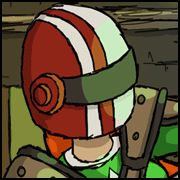|
Pvt.Scott posted:I own a lot of Kevin Crawford’s stuff, but this doesn’t ring a bell. His work is almost all tables, in a very good way. Like, is there a system that uses d66 for resolving tasks or combat? Cyborg Commando.
|
|
|
|

|
| # ? Jun 10, 2024 00:51 |
|
Pvt.Scott posted:What sort of blasphemous things could you do with a d66 besides using it for random tables?
|
|
|
|
Pvt.Scott posted:What sort of blasphemous things could you do with a d66 besides using it for random tables? If you mean any kind of roll with 2 6-sided dice where they're not just added together, subtracted, multiplied, or compared in a pool, then... coordinates from 1 to 6 and A to F? Or exponential values, so one die is the number of zeroes behind the number on the other die (so 2, 6 could be 2000000 or 600)?
|
|
|
|
There's only gaps if you stick with base 10! It's also a hilarious look behind the curtain at how meaningless the singles digits are in a simple base percentile system.
|
|
|
|
I mean, go for it, if you want your game to be a hit in certain regions of Papua New Guinea  Unrelated, did anyone put anything in for the 200-word RPG Challenge this year? Here's my entry, Dirty Papers. It's about being an archaeological dig team in ancient ruins, and academic hierarchy, and it's kind of incomplete (I had to cut the longer-term and endgame mechanics off to fit under the limit, but I'll publish the whole thing on itch soon).
|
|
|
|
Pvt.Scott posted:I own a lot of Kevin Crawford’s stuff, but this doesn’t ring a bell. His work is almost all tables, in a very good way. Like, is there a system that uses d66 for resolving tasks or combat? Turns out I'm an idiot, the RPG is called IN Nomine, and it's a d666 system.
|
|
|
|
UnCO3 posted:Unrelated, did anyone put anything in for the 200-word RPG Challenge this year? Here's my entry, Dirty Papers. It's about being an archaeological dig team in ancient ruins, and academic hierarchy, and it's kind of incomplete (I had to cut the longer-term and endgame mechanics off to fit under the limit, but I'll publish the whole thing on itch soon). My submission was Hush, where I tried to figure out a mechanic for a Pontypool-style poisoning of language and concepts while players struggle to connect with each other after a linguistically-driven apocalypse. Likewise, I had to give up on any more in-depth mechanics to fit the word count, but I guess that's kind of the point of the contest.
|
|
|
|
UnCO3 posted:Unrelated, did anyone put anything in for the 200-word RPG Challenge this year? Not I, but I did get my feet wet with RPG Geek's 24 Hour RPG contest. I don't think I'm quite up for the 200 word variety. Has anyone participated in the RPG Writer Workshop? The fall session is about to start up and I was considering trying it out. For a quick sample of what past attendees have created, here's more stuff on RPG Geek.
|
|
|
|
Flail Snail posted:Has anyone participated in the RPG Writer Workshop? The fall session is about to start up and I was considering trying it out. For a quick sample of what past attendees have created, here's more stuff on RPG Geek.
|
|
|
|
Flail Snail posted:Not I, but I did get my feet wet with RPG Geek's 24 Hour RPG contest. I don't think I'm quite up for the 200 word variety. Cheers for this - I've been procrastinating writing the intro adventures for my games, so this should help a lot.
|
|
|
|
I've just finished up Public Beta 4 of my game, Erebus! It's a lean, crunchy tactical sci-fi action game inspired by Aliens, Into the Breach, and most ensemble action movies you could name. Players take on the role of a team of soldiers fighting an alien invading through time. It's probably my most experimental iteration, as I'm trying to move away from what I feel is some needless bloat. I'm trying to cut the game down to the leanest form I can, then build back up from that. I'm focusing on getting the core engine nice and reliable, then I'm going to start fleshing the game out in other directions, like adding a strategic layer and potentially trying to add a bit of narrative clout to the Archetype rules. The major change is how the core combat resolution works and some elements of character advancement. Attack rolls now operate on a fixed target number system similar to PbtA: You roll 2d6, and a 2-5 is a miss, a 7-9 is a hit, and 10-12 is a critical. Misses deal no or grazing damage (if one die used in the set rolled at least a 4), hits deal normal damage, criticals deal maximum damage +bonuses if relevant. Rolling an unmodified attack and having nothing happen is fairly rare - you'll have a 3/4 chance of at least sneaking a glancing blow in. There's no way in this system to directly modify a die result - all modifiers add Accuracy or Difficulty dice. Both add d6s, and cancel each other out ala Advantage/Disadvantage, with the difference that multiple sources can stack, so 2 Accuracy factors would give you +2d6. You roll the extra dice and choose the highest/lowest two depending on whether you're rolling with net Accuracy or Difficulty. You can roll up to 5d6 total (so net +3 Accuracy or Difficulty is the maximum). Character advancement is solely horizontal, while equipment advancement is vertical - levelling up doesn't make your stats better but gives you more options, while getting / modding superior equipment increases your damage, attributes, etc. All your character's baseline attacks and defences are tied to your gear. I'm hoping to get a playtest done in order to confirm any concerns I have - primarily, that the dice system has a fairly large jump between 0 and 1 Accuracy/Difficulty. Going 1 step in either direction is a ~25% modifier, which then tails off as you hit the higher degrees. However, tiny incremental modifiers are the Devil, so I'm theoretically happy with any existent modifier being a big game-changer. Any feedback would also be appreciated from anyone with the time to take a look! Zeerust fucked around with this message at 22:52 on Oct 23, 2019 |
|
|
|
I shat out a pokemon thing in the TG chat thread, I guess I should post it hereLunatic Sledge posted:https://drive.google.com/file/d/1zaIwa6ZQ-s6sKBXwWpWyRs-gAZLQIlyi/view?usp=sharing I'm still doing card math / testing for similar mechanics in other projects, but I think it's more or less mostly playable
|
|
|
|
JMBosch posted:My submission was Hush, where I tried to figure out a mechanic for a Pontypool-style poisoning of language and concepts while players struggle to connect with each other after a linguistically-driven apocalypse. Likewise, I had to give up on any more in-depth mechanics to fit the word count, but I guess that's kind of the point of the contest. - More maths+stats+simulations: I thought I’d do a post about a godgame system I designed and then never used, because it builds on some of the stuff I went through before (roll-and-keep dice pools) in a slightly different way - adding together the top results from multiple pools, while also comparing the total result of each pool. Basically, it gets more info out of the dice you roll than just one or two numbers. This next para is just a little about the history of godgames in TG, so feel free to skip ahead. There’s a pretty long history of godgames in TG (continuously all the way back to 2009), and many (but fewer recently) are based on PDQ – Prose Descriptive Qualities – a super-light rules system where you roll 2d6, add any bonuses (traits/skills/gear/etc.), subtract any penalties (flaws/weaknesses/injuries/etc.), and compare against a target set by the GM. It’s so light that it’s very easy to set up any kind of game based on it, but it’s also so light that it doesn’t really guide or help you narratively (except to justify applying as many bonuses and as few penalties as possible). To help fix this, people who’ve ran godgames in the past have come up with loads of extra mechanics to layer on top of their specific games, or hacked other systems (e.g. Spire, BitD, or FAE), or even come up with their own (e.g. Dog Kisser’s pseudo-CYOA, audience-interactive game The Fragile Gods of Somewhere and its descendants like The Broken Gods of Elsewhere). I’m one of those people – specifically, I ran a godgame a couple years ago called Five Centuries of Flux using a PDQ-based system where the major conflict was between your god’s Domains (things they have power over and responsibility for) and their Hungers (desires they can pursue without restraint). That game was a success, mainly despite the system, and a proof of concept for me that the general idea worked. At the same time, I’d been working on a PDQ-like but original system with that conflict baked in from the start. I’ve moved on and never really got to test that probably-better system, but I still think it’s kind of neat, and like I said above, it takes some of the basic mechanics I've gone through before and goes one step further, which I think might be useful to look at. A GODGAME RPG: FROM DAWN to SHINING DAWN Here’s how the basic mechanics work: Your character has a Domain, a list of things that fall under their responsibility and control. Elements, cults, servants, concepts, all that. They also have Hungers, a list of things they desperately want or need: end-goals like ‘Peace’ or ‘Conquest’ or drives like ‘Greed’ or ‘Love’. For example, let's say Zeus has the Sky, Fatherhood, Judgement, and mystery cults in their Domain; their Hungers are Pride and Lust. When your god takes action:
How does this work out across all possible combinations?  Above: A lattice plot of the probability of each result for rolling 1 to 6d6 for Domain and 1 to 6d6 for Hunger (results would be mirrored across the midline, e.g. if you roll 2 Domain/1 Hunger it’d give you the same as 1 Domain/2 Hunger). Bottom-left is an example plot (1 Domain/1 Hunger) with the same axes as all of the smaller plots. Adding dice to one or the other pool makes you more likely to succeed, pushing the peak from 7 to 9. Adding to both pushes it further, and rolling 5-6 in both means you'll most likely get an 11 or 12. So first-off, you obviously get diminishing returns, as usual for roll-and-keep dice pools. That means it’s better to boost each pool a little rather than one pool a lot. For example, rolling 3 Domain/3 Hunger gives you pretty similar results to 6 Domain/2 Hunger (or 2/6). Secondly, it has kind of a neat step-like effect, where going high on one pool insulates you from low results, but doesn’t guarantee that you’ll win against high targets. So, why bother spending so much DP if you could just boost your Hunger a little? Well, as you might expect, there’s a problem with gods or similarly-powerful beings acting on their desires without keeping themselves in check. The more your character indulges in their Hunger, the more likely those desires are to influence or corrupt their deeds elsewhere. Mechanically: After each roll you total up your Domain results and Hunger results, and if your Hunger total is higher, your action has a Consequence (set by the GM) linked to one or more of your Hungers. If you want to avoid those Consequences, you need to spend more DP before the roll to cut down your risk. For example: let’s say Zeus fathers a powerful demigod with a mortal, which the GM decides is a difficulty 9 task. Their player spends 1DP and their Hunger is currently at 3, so they roll 2 Domain/3 Hunger. Their Domain results are 3 and 6; their Hunger results are 1, 4, and 5; their total is 6+5=11, so they succeed; however, their Hunger (1+4+5=10) just barely beats their Domain (3+6=9), so there’s a Consequence. Their player describes the allegorical moment of conception (Zeus turns into a bull/swan/whatever) and the childhood of the new demigod, and the GM describes how the child is brutishly prideful and uses the name and divine reputation of their father as a justification for conquest and dominion even from a young age… Here’s what that looks like when you spend DP against 1, 3, or 5 Hunger:    Above top: A plot of your chance of triggering a Consequence with 1 Hunger, spending 0-5DP (anydice code). The crossing point, where you're just about more likely to not cause a Consequence, is 1 Domain (spending 0DP). Above middle: As above, but 3 Hunger. The crossing point is 3 Domain (spending 2DP). Above bottom: As above, but 5 Hunger. The crossing point is 5 Domain (spending 4DP). So you need Domain to at least match Hunger to get more clean than messy successes. Until Domain equals Hunger, you get increasing returns, and after that you get diminishing returns. If you don’t care about Consequences and/or you can somehow convince the other characters (god or mortal) to not care, then you’re free to boost Hunger right to the top and roll high for almost everything you do. Otherwise, you’ll need to manage things a little more carefully. Rolling any Domain/1 Hunger is at best on par with 2 Domain/2 Hunger (anydice code; click View: Table and Data: Summary; look for 2D2H and compare to 6D1H), so you might as well indulge a bit. This is especially true if you really want to succeed or win conflicts, where having a high Hunger pool really helps out (anydice code; click View: Table and Data: Normal; “1” is the chance of a character rolling 6 Domain/6 Hunger beating a character rolling 6 Domain/1 Hunger). So, that’s the core system! The idea is to give you a lot of power while also pitting four major choices against each other – do you go easy and accept the possibility of failure, dredge your Domain for support at the cost of stressing it out, dive into your Hungers at the cost of losing complete control, or go hell for leather on everything? These all tie into the rest of the mechanics for the game, but at the base it comes down to what your character values, how they relate to that, and how much of that they’d risk to achieve their goals. At the same time, the mechanics for each pool represent what's happening narratively - you're expending or wearing down your Domain, eventually to the point of exhaustion, and you're slowly building up drive and power through always-rising Hunger. - I’ve also recently been working on a post about using simulations as part of my design process with my game The Cromlech Archives, which uses playing cards (so, significantly different mechanics from most of the stuff I’ve gone through here), but I’m also thinking of doing some more stuff, in no particular order:
|
|
|
|
So, this isn't so much pitching a mechanic that needs work, so much as brainstorming some setting details. One of my multiple projects is an RPG I'm currently calling Freelancer which is kind of a Shadowrun heartbreaker: a fantasy/cyberpunk mashup where the players are essentially wild card mercenaries-for-hire. One of the setting conceits is that it's a fantasy world that has progressed technologically to a cyberpunk level (amount of magitech involved TBD) but has not progressed sociologically much at all. So the police force is a literal order of knights. The mega-corps are guilds, and the labor force consists mainly of serfs beholden to ancestral nobility. The lords effectively own the fealty of the serfs and their labor is sold to guilds for the lord's profit. So, there are 4 basic castes in the setting: *Noble: You're a member of one of the established noble lines. Noble families are big, so most nobles have limited personal power and some noble families no longer have any holdings or serfs, only retaining their title. However, it comes with the most rights: you can openly carry weapons (like a handgun or a sword, not rocket launchers), you have the freedom to travel and work as you wish unaccompanied and you have the right to vote. *Citizen: A citizen is a non-noble that has been granted some rights. They're most common in the guilds, but can also represent independent business owners, skilled laborers, etc. They have the right to work and travel as they wish and can own property, but not serfs. They may own weapons for home defense, but can only carry weapons if their job requires is (such as a member of the police or private security). They can have things like credit cards, bank accounts and so on. *Serfs: almost no rights except those granted by their lord. Serfs essentially cannot own property. They also cannot marry or travel without their lord's authorization. They are not technically slaves (notably, they do have to consent to be given to a different lord, but not to be "contracted" temporarily to a third party) and the lord must provide room and board and at least a pittance wage. But it's a pretty fine distinction. Serfs may not have things like credit or loans, but they may have bank accounts held in trust by their lord (who can review all transactions if they choose). Serfs are implanted with an ID chip that cannot be legally removed unless they're granted citizenship. *Freemen: Freemen are not beholden to a lord, but are technically the lowest caste as their status means they have almost no rights at all (almost...killing a freeman is still murder but don't expect the police to actually care). A Serf cast out by their lord or a citizen stripped of their status would be a freeman. They are not officially permitted entry into most cities and have no right to own land, have a bank account, etc. There is also a weird, 5th status: the eponymous "Freelancer". Essentially, a holdover from the settings past where any and all problems were solved by wandering adventurers and knight-errants. Although society has become more modern since then there are still a lot of problems that can be solved most easily by paying a disposable swordsman to go at it so it's been in the best interest of the nobility and guilds to keep the freelancer system operating. As I'm currently envisioning it, the freelancer system works by tokens, not unlike a taxi medallion. A freelancer is identified by a literal physical token that can be given away or sold freely (or stolen). Probably magical to prevent easily counterfitting or duplicating them. Now, what I'm trying to do is come up with reasons a Freeman or Citizen wants to keep their hands on a freelancer token instead of just pawning it off for a decent sum and why some folks would only deal with freelancers for important tasks. These are my thoughts so far... *The tokens give you the right to travel with less restrictions than a Freeman, so you can do work in parts of the city or country a freeman couldn't. *The tokens give access to Freelancer exclusive organizations, possibly including banks or referral services that deal only with freelancers. *The right to bear arms, within certain limits. Or at least the right to purchase and own them (if not carry openly). *Your freelancer token can be used in place of ID in many situations, allowing you to act with relative anonymity. I'm trying to think of what other rights it might grant without going too far overboard (something like immunity from prosecution is an obvious no-go). Any thoughts and/or holes to poke in what I've talked about so far?
|
|
|
|
oriongates posted:I'm trying to think of what other rights it might grant without going too far overboard (something like immunity from prosecution is an obvious no-go). Any thoughts and/or holes to poke in what I've talked about so far? *Medallions allow the bearer to legally use magic, as opposed to being hunted as a witch. *They are both currency and proof of identity within the organisation (example John Wick) *The medallions project what you do to a social networking site. Freelancers are as much social media influencers as mercs, and as they rack up jobs, they rack up views, netting them potentially millions. *The medallions can be exchanged for a one-time thing on the scale of resurrection - folk hold on to them as a 1-Up. *Mediallions are bound with a number of servants that do the mundane tasks that a Freelancer couldn't be bothered with. laundry, tilling fields, all the things that a serf/freeman has to do for a living - although as soon as anyone knows they have it, they're likely to lose it.
|
|
|
|
A long time ago a band of mercenaries saved the world from monsters, or overthrew an evil king, or evil monster king, or just a regular king who couldn't afford mercenaries. Who remembers. What is remembered is that in "gratitude" they were granted exclusive rights as the only permitted mercenary companies within the kingdom, but under the condition of the organisation itself disbanding, and its members gathering in no groups greater than (party size). A reward that also neutered the biggest threat to the new rulers, for those that saved, or overthrew, a kingdom, could do so again. If you want more freedom than a serf, if you want more rights and marginally more respect than a freeman or bandit, if the guilds will not have you, if your family has disowned you, or if you just have an overdeveloped sense of romance and mystique, you become a There is no central authority of freelancers. If you have the token you're a freelancer. If you don't you're not. Freelancers are very protective of their tokens, as handing them to someone unworthy lessens the whole group. Of course, what's considered worthy varies from freelancer to freelancer. "Bought" tokens happen, and there's no law against it, but any freelancer who finds this out will treat you with suspicion until you prove yourself. A freelancer lucky enough to retire will usually retain her tokens as a keepsake until she finds someone worthy of passing it off to. More often a stranger comes to your door, or tent, and hands you a token, saying "Your brother/sister/father/mother/uncle/aunt wanted you to have this". Sometimes a freelancer has two tokens, looking for someone to replace a friend in the fold. And sometimes a boy hired for his strong back emerges from a dark tomb, with a bloodstained token and a haunted expression and a promise to a dying man he knows he must keep. Do you have a token? If so, how did you gain your token? If not, why did you choose to, or were forced to, leave polite society? Splicer fucked around with this message at 17:03 on Oct 25, 2019 |
|
|
|
oriongates posted:One of my multiple projects is an RPG I'm currently calling Freelancer which is kind of a Shadowrun heartbreaker: a fantasy/cyberpunk mashup where the players are essentially wild card mercenaries-for-hire. For cyber-feudalism inspiration in general, though, you might want to breeze through the Zigguratti setting mini-primer by Chad Walker, cobbled together on the Gauntlet forums: https://drive.google.com/open?id=1hT9C9Bpghox1HkM4qh3-PU2h_rumb963
|
|
|
|
JMBosch posted:I really like your setting ideas. It's funny, though, that I had the opposite first reactions to the idea of the Freelancers as you and everyone else did. Instead of them wanting to hold on to their medallions for the privileges they bestowed, I imagined that the position would be a burdensome one that nobody else wanted, and, as a result, they probably couldn't give their medallions away if they wanted to. I imagined it as a mix between an old-fashioned position people are amazed hasn't been phased out yet, a distrusted group that wasn't beholden to anyone, and an overtaxed public good that everybody dumps their problems on and expects them to help but nobody wants to properly compensate. But there's probably a bit too much contradiction in those characterizations, and you've got quite a bit of good material to work with for the privileges aspect.
|
|
|
|
Thanks for the feedback guys, I'll digest these ideas a bit and see what I can come up with. I should mention that although the setting isn't quite as dystopic as Shadowrun, it's still a much less heroic setting than your standard fantasy milieu. Even back in the early days, Freelancers were pretty morally gray on average and in modern times they're even more so. That said, one thing I am trying to move away from is the whole "working for the corp" aspect. Guilds and Nobles make use of them as tools of convenience, but more common employers will be individuals who want to avoid official channels, criminal factions, or folks low on the social ladder who can barter or scrape up some cash but can't get the assistance of real law enforcement (i.e. serfs and freemen). Currently, I'm thinking one of the big selling points will be the right to basically have the essential tools of an adventurer: weapons, armor, magic...including stuff that might not be legal even for citizens like explosives or heavy weapons. You can still be arrested for doing anything illegal with them, and "disturbing the peace" charges prevent you from just rolling around with a rocket-launcher on your shoulder. But it means that you can't be arrested for just having an arsenal in your house and you can freely buy this sort of equipment with the freelancer token substituting for the licenses a Citizen, or even a Noble, might ordinarily need (and since the token is not personalized, the purchases can be anonymous). This also includes the ability to travel across many borders that might otherwise be barred to the lower classes, since old-timey freelancers would be wandering adventurers (modern-day ones are probably more settled). Still pondering whether or not to have a freelancer organization which provides things like a bank account or maybe even holding property in the name of the freelancer if their own status doesn't allow it.
|
|
|
|
oriongates posted:Thanks for the feedback guys, I'll digest these ideas a bit and see what I can come up with. I think you're looking for the term 'independent Contractor'. All of the benefits of having employees, with none of the downsides, like liability, healthcare, benefits, unions, job security, discrimination protection, etc. Professional wrestling is a good example of a real world industry that hires people for physically dangerous jobs while avoiding all of the expenses of doing so (you're paying for your own gas, for example). If you were a Megacorp/Great Guild, and you had a choice between your private security forces that you've trained, retained and equipped, or some poor schmucks with almost no rights and a desperate need for any work at all, which one are you gonna send into a deathtrap dungeon to recover something? The freelancer, of course, gains fame and medical bills.
|
|
|
|
I'm coming up on the end of a replay of the ill-fated CRPG Tyranny, and given that it ends with a rather ripe cliffhanger that will likely never be resolved, I'm thinking of launching a CYOA sequel. This would be somewhat natural as the game begins with a "Conquest" CYOA sequence that presents a fairly manageable branching template that lends itself to PbP (eg you must subdue a city; choose to march on the gates or infiltrate with espionage, each route presenting two sub-approaches or tactics). The game would be broadly strategy-based, either conquering or currying favor with different regions / fiefdoms in opposition to a fantasy-totalitarian Overlord and deciding how to manage and use faction armies that are usually cultists of a particular Archon demigod (who you will inevitably encounter and subjugate / destroy / recruit). I want to keep to the spirit of the original game but on a wider, shallower scale. * So I come to the thread with two questions: (1) What mechanics do you think would be interesting, and dynamic, to track in such a game? The obvious routes are either pure storygame CYOA (which seems a bit slight, but I can do easily) or light resource management. Eg, you have gained territory A that you must garrison against enemy attack or rebellion; you have armies X/Y/Z that can be used mobilized for this purpose, or you can use an Archon, which is much more powerful but rarer and cannot be redeployed. I can throw something like this together but I don't have much of a mind for balancing numbers - I could come up with narrative variation on my own but not a system. I could also add more resources by abstracting other things like the recovery of powerful artifacts or Edicts (basically mythals or magic nukes, in the setting). Alternatively, I could do something more like Dragon Age: Inquisition's war room, where instead of making the tactical decisions yourself, you are faced with problems and then have the choice of delegation to different commanders / subordinates / Archons with different methods, and then have those choices gain and / or lose abstracted consumables or "health" or what have you. (2) Help me out with Godcraft. The world of Tyranny is peppered with Archons, mortal demigods powered by renown and belief, who have particular domains, and some of whom are associated with geometric / geotic sigils that can be used in magic spells. Visually / conceptually they're like D&D Genasi or Aasimar on steroids. These Archons are meant to be quite numerous in the setting, but there are only so many mentioned in the game. So I'd be curious for your ideas on filling out the Archon roster that players could encounter. They may or may not have schools of magic associated them, but they all tend to have cults (large or small) of magician or martial followers. The Archon template seems to allow for both straightforward elemental forces and, to some extent, human concepts, which new Archons would have to fit into. Their magic translates to "Control (x)". Examples in the game include:
There are also magic schools with as-yet unmentioned Archons, such as "Control Vigor" and "Control Force". Basically, if you think of a particular kind of force / conceptual magic, or a particular idea for an Archon, I'd love to hear it.
|
|
|
|
So I'm working on a game with deterministic combat - inspired, in part, by Panic at the Dojo. I love the idea of rolling dice and then deciding what to do. But I don't know many games like this. Can anybody refer me to games wherein the outcome of your actions is known? Where you roll dice before deciding how your turn plays out? I don't care if the game is good, just interested in seeing other ways this is done. It's exhausting wrapping my head around it.
|
|
|
|
CitizenKeen posted:So I'm working on a game with deterministic combat - inspired, in part, by Panic at the Dojo. I love the idea of rolling dice and then deciding what to do. But I don't know many games like this. Can anybody refer me to games wherein the outcome of your actions is known? Where you roll dice before deciding how your turn plays out? Most diceless TRPGs I know of aren't very tactical-combat focused, but just the same: Amber Diceless any version of Nobilis a bunch of other games I mostly haven't heard of or which aren't immediately applicable (like Dread counts on a technicality, for instance) which you can find here: https://en.wikipedia.org/wiki/Diceless_role-playing_game in terms of things to mine for inspiration, I strongly recommend playing Into the Breach until you've got a few wins under your belt -- it's a fantastic proof of concept, as well as a good demonstration of how to have some elements of randomness (most importantly, re: enemy spawn locations) while still having deterministic outcomes to player actions more stuff as I think of it
|
|
|
|
oh poo poo, right -- Wargroove it's an indie Advance Wars clone that actually manages to improve on the already-stellar AW mechanics. it's a game where you recruit units and they're largely expendable so translating it to an RPG with long-term persistent characters might involve a lot of analogy and trimming but it's definitely still worth a look e: i've been informed that Wargroove actually has a +/- 5% spread to damage, but it shows you the minimum possible damage result on the combat results preview, so it's still a decision made with nearly all the information already known Tuxedo Catfish fucked around with this message at 00:35 on Nov 6, 2019 |
|
|
|
CitizenKeen posted:So I'm working on a game with deterministic combat - inspired, in part, by Panic at the Dojo. I love the idea of rolling dice and then deciding what to do. But I don't know many games like this. Can anybody refer me to games wherein the outcome of your actions is known? Where you roll dice before deciding how your turn plays out?
|
|
|
|
The first thing that springs to mind for a crunchier 'roll, then work with the results' is Legends of the Wulin's dice set resolution mechanics.
|
|
|
|
It occurs to me that I have far too many personal pen and paper rpgs projects that if I divide my attention they will never be completely, I'm looking for some advice for which one i should put my focus on until I finish it. I narrowed down it two I felt the most investment in/the most "marketable" ones. Allow me to explain them briefly RAID stands for Random Adventurers In Dungeons, I've talked about it here, it's main premise is that you roll your race along with your two classes, along with what specific powers your character has from it's class they have at the start, (everything else skills, background, is decided by the player) and you get some truly oddball stuff. your goal is to justify it and make a background for it as a roleplay challenge. Races are designed that no matter you roll, it's not crippling not matter what race you role it's not awful. They were will optional tables in the back for background and stuff if you wanna role randomly your background as well. There's the obvious problem of random generation of class/race being off putting to people, the rules are designed in a way to that nothing breaks if you allow everyone to pick, but it's still part of the fun of the system. The main inspiration here is Gamma World. Cassandra(Name subject to change), is an RPG where you play in a world where everyone has some sort of supernatural advantage (called a "Blessing"), and a practically or symbolically related disadvantaged (Called a "Curse"), an example I'm gonna use is a sample character I have in mind that can summon a variety of powerful weapons and fuse them together, but his curse is that any clothing is heavier on him to the point that anything resembling armor he would wear would be impractical. The setting semi-sci-fi in terms of tech level. They are two main societies one very structured, the government assigns you an optimal job based on your blessing and curse (unless your blessing is so minor, then you can choose your job), you need government approval for stuff like even having kids, but the government gives everyone the the basic necessities but there isn't much in the way of real money (You have credits you can exchange with the government for luxury goods but that's it). The second is much more free, you have freedom and stuff, but their obviously the issues of economically inequality and poverty exist, and government support is minimal. Outside of major cities and surrounding farm lands, which are all protected by barriers and the like, the areas between the cities are filled with monsters and the like, so as a combat squad (either a government thing in the orderly society or a group of a mercenaries in the free society), your job is to rescue who got lost outside of the cities, or find outlaws/rebels who hide outside of the city areas, or just escort people who have business outside the city walls, etceria. The issues in this one are large: First off I basically need create an asset and flaw system, and while I already have a solution to the whole "min max take a flaw that doesn't matter" (You don't get any extra points from from your curse, instead your curse gives you XP every time it matters), basically making any advantage that I would need for this type of setting, not to mention the customization needed, is gonna be hard, almost a GURPs like task. I could make the game rules lite like Masks or something and just make it so your Blessing and curse don't matter much mechanically but that's not fun in my opinion. My current solution to make things easy for the player is to have a "lite" version is by having a bunch of pre-built blessings with point cost and an "advanced" version which allows you to take the core advantage and apply the modifiers yourself to fine tailor it your desires. (Obviously the points used to make your blessing aren't just for your blessing it can be used to buy some more general advantages and give you extra attributes and skill point). EDIT: I think honestly I managed to solve my own problem in the process of writing that I'd preffer to work on cassandra more when I was writing it. If someone else has any input that's different let me know but I think i'm decided. weso12 fucked around with this message at 22:48 on Nov 10, 2019 |
|
|
|
weso12 posted:It occurs to me that I have far too many personal pen and paper rpgs projects that if I divide my attention they will never be completely, I'm looking for some advice for which one i should put my focus on until I finish it. I narrowed down it two I felt the most investment in/the most "marketable" ones. Allow me to explain them briefly Well, you wrote triple the words about Cassandra than about RAID, so focus hard on that while you’re already jamming on it. If you get stuck or burnt out, you can always switch to RAID till you get back in the mood. If you think of a cool mechanic, setting detail NPC or whatever that doesn’t work for your current project, note it down and put it in a folder of similar ideas. Then go back to working on your focus project. Those bits of ideas might fit into RAID, or maybe even inspire a new project. I’ve got a friend who has published quite a lot of material, but has a darling project he’s been rehashing since high school. Dude has so many different versions he could have released that game about a dozen times by now(with commissioned art even!). If your Cassandra game is similar to that, sit down and set your core mechanics goals, what setting information/fluff will actually get used in play, get a second draft done and send it out for playtesting to a bunch of people. Gather the criticism and suggestions you got, change stuff that you feel needs changing and shove it out the door, even if it’s just as an plain text file. You can always do a “revised” or “real” edition later if people like it. E: I need to take my own advice re: my fantasy heartbreaker, so take my advice with a grain of salt. Pvt.Scott fucked around with this message at 00:19 on Nov 11, 2019 |
|
|
|
Hodgepocalypse - regional sourcebook poll https://www.drevrpg.com edit: here's a couple of alternatives until I can figure out why it's glitching. https://www.drevrpg.net https://www.drevrpg.ca The main book is ready to go and should be out in December. However, thinking ahead for regional sourcebook and seeing if the following poll grabs you for future material. https://twitter.com/drevrpg/status/1194034837432107009 shades of eternity fucked around with this message at 03:54 on Nov 12, 2019 |
|
|
|
Are you sure that URL is correct?Chrome posted:This site can’t be reached e: Huh, I googled drevrpg and found this link that works: http://www.drevrpg.com/?m=1. But just drevrpg.com by itself throws an error. At least on my phone. Anyone else having the same issue, to verify whether there's an issue with the site or just something going on with the browser on my phone? Jerik fucked around with this message at 02:21 on Nov 12, 2019 |
|
|
|
Same. Your link works, the original returns an error.
|
|
|
|
cripse, checking what the heck. edit: it seems to be working now on my end. can I confirm? shades of eternity fucked around with this message at 04:31 on Nov 12, 2019 |
|
|
|
shades of eternity posted:edit: it seems to be working now on my end. Odd. It's working for me in Firefox, but not in Chrome or Microsoft Edge.
|
|
|
|
okay its working on chrome on my end. I'm open to suggestions at this point.
|
|
|
|
The link with https:// doesn't work, the link with http:// (no s) does work. The site isn't set up to use https, that's all.
|
|
|
|
Fuego's got it. Never mind.
|
|
|
|
shades of eternity posted:Hodgepocalypse - regional sourcebook poll Not available offline is a pain in the rear end.
|
|
|
|
Fuego Fish posted:The link with https:// doesn't work, the link with http:// (no s) does work. Ah ha. That makes sense. Apparently on my phone and computer, Chrome and Microsoft Edge (but not Firefox) try to use https by default if the protocol isn't specified, hence the page appearing broken for me on those browsers. If I explicitly type "http://www.drevrpg.com" into the address bar instead of just "www.drevrpg.com" it does indeed work. This is probably still an issue worth fixing; if you can figure out how to set up your site to use https, it's probably a good idea to do so. You don't want your site to look broken when someone types in just the URL without the http://, and even if it doesn't look broken for everyone I'm probably not the only one with this issue—and I think the internet is moving toward increasing use of https, so this is likely to get worse over time. Still, at least Fuego Fish seems to have pinpointed the cause of the problem, so now that you know exactly what it is it should be easier to solve. (Edited because the forum software tried to automatically turn "http://" into a link.) Jerik fucked around with this message at 18:12 on Nov 12, 2019 |
|
|
|
k I think I flipped the right dongle to insist on https. I'm giving it 30 minutes and then will test.  edit: working on my end. can somebody try it now? shades of eternity fucked around with this message at 19:18 on Nov 12, 2019 |
|
|
|

|
| # ? Jun 10, 2024 00:51 |
|
Can confirm, not hosed on my end.
|
|
|
































